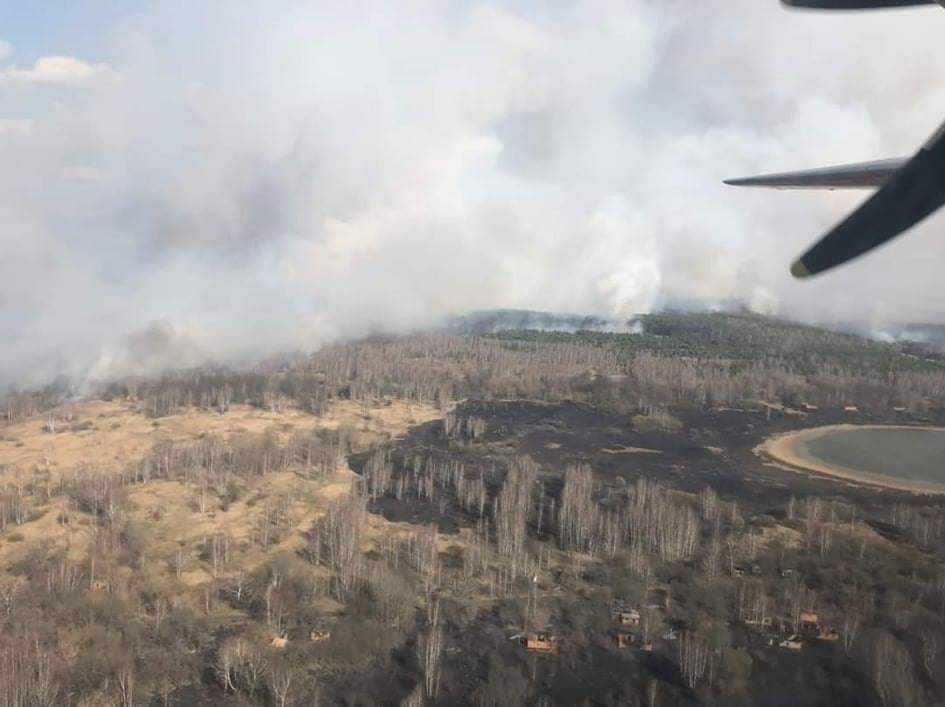Wildfires break out in Chernobyl amid a non-functioning radiation-monitoring system
By Susan D’Agostino | March 23, 2022
 Fire in the Chernobyl Exclusion Zone from an earlier wildfire in April 2020. Credit: State Agency of Ukraine on Exclusion Zone Management. Accessed via Wikipedia. CC BY 4.0.
Fire in the Chernobyl Exclusion Zone from an earlier wildfire in April 2020. Credit: State Agency of Ukraine on Exclusion Zone Management. Accessed via Wikipedia. CC BY 4.0.
Seven wildfires have broken out in the exclusion zone surrounding the Chernobyl Nuclear Power Plant, the site of the world’s worst nuclear disaster, according to a statement by Ukraine’s Parliament. The fires, which were observed via satellite, exceed Ukraine’s emergency classification criteria tenfold. Ukrainian officials stated that the fires were caused by “the armed aggression of the Russian Federation, namely the shelling or arson,” though this has not been independently verified. Wildfires risk mobilizing and dispersing radioactive contaminants left over from the 1986 nuclear accident at Chernobyl.
Ukrainian firefighters have been unable to access the area since Russia took control in the first days of the war. Energoatom, Ukraine’s state nuclear company, also reported this week that Chernobyl’s radiation monitoring system is no longer working. Without the data that system would provide, radiation levels in the region may rise unchecked. Though the Chernobyl nuclear power plant is no longer operational, it requires constant management.
Ukraine’s State Agency on Exclusion Zone Management also reported this week that the Russian military destroyed a six-million-euro laboratory that, in part, worked to improve radioactive waste management, according to the Associated Press. The lab contained “highly active samples and samples of radionuclides” that could have been released, according to the agency.
Seasonal wildfires are common during spring and summer in the region surrounding Chernobyl. An April 2020 wildfire required more than 100 fire trucks with accompanying firefighters to extinguish; still, it burned more than 8,600 acres. Following that fire, the Chernobyl management team adopted early intervention efforts, such as moving firefighting equipment to the region in advance of fires, that helped mitigate risks. The team also offered fire-prevention education to workers in and residents living near the region. Those efforts kept the 2021 fire season under control, Kateryna Pavlova, Chernobyl’s Head of the Department for International Cooperation and Public Relations, told the Bulletin. “Last year, we prepared the exclusion zone to [prevent] a big fire, but this year it’s the opposite,” Pavlova said. “We are not prepared.” She added that the wildfires of concern started in March this year, whereas in years past, such fires, including the big one in 2020, started in April.
The current wildfire crisis follows a series of unfortunate events at the infamous Chernobyl site in the past month. After Russian forces took control of Chernobyl, they held hundreds of plant workers hostage in what the International Atomic Energy Agency call a “dire situation.” The staff worked at gunpoint, without replacement and despite exhaustion, to maintain safety at the nuclear facility. This week, some of the staff were freed, with priority given to those who were sick, after more than three weeks of captivity. Many of those who have been released have been unable to return to their families as the Russian military has not provided safe corridors, Pavlova reported.
Earlier this month, the plant also was cut off from the power grid, which raised concerns about monitoring the level and temperature of water in spent nuclear fuel cooling pools. The plant operated on emergency diesel generators during the power outage, and power has since been restored.
Russian forces also shelled and took control of Ukraine’s Zaporizhzhya Nuclear Power Plant—the largest in Europe—earlier this month. Though that incident resulted in no change in radiation levels, nuclear experts have expressed concern that an intentional or accidental wartime strike on a power plant’s reactor or spent fuel cooling pools could exact a significant human and environmental toll.
Together, we make the world safer.
The Bulletin elevates expert voices above the noise. But as an independent nonprofit organization, our operations depend on the support of readers like you. Help us continue to deliver quality journalism that holds leaders accountable. Your support of our work at any level is important. In return, we promise our coverage will be understandable, influential, vigilant, solution-oriented, and fair-minded. Together we can make a difference.
Keywords: Chernobyl, Russia, Ukraine, nuclear energy, nuclear power plant, nuclear risk, war
Topics: Nuclear Energy, Nuclear Risk















